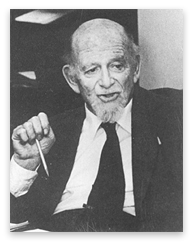Liberty Matters
A Bit More on Subjectivism
 In this follow-up to Professor Lewin's insightful comments, I would like to address this thing called subjectivism and push a little deeper into the very interesting way Lachmann understood this concept and came to formulate his more complex or radical understanding of it.
In this follow-up to Professor Lewin's insightful comments, I would like to address this thing called subjectivism and push a little deeper into the very interesting way Lachmann understood this concept and came to formulate his more complex or radical understanding of it.The idea of subjectivism has a much older history in economics than even that presented by Emil Kauder in his justly famous history of marginalism. And while many recall Rothbard's enthusiastic appraisal of Kauder's work as revealing an objectivist root in the Aristotelian vein, the reality is quite a bit different for the development of the sort of complex subjectivism from which Lachmann's understanding was derived.
Mises certainly understood this other path of subjectivism, which is why he, more than any other student of Menger's work, strove to ensure the transference of the Austrian approach to a neo-Kantian foundation. Rothbard disparaged that approach for reasons already mentioned. For him, Mises was heading down a wrong path, and while Mises certainly saw dangers in historicism, from Rothbard's perspective, he should have done an immediate about-face and returned to Menger's more Catholic-Thomistic roots. For Lachmann, however, Mises's problem was that he had not traveled far enough down the logical implications of that road! Let's have a look at what that direction entails and why it might have produced the characteristic complex subjectivism for which Lachmann is rightly known.
To be thoroughly subjectivist, an orientation must be relentlessly from the perspective of the acting agent under investigation. Presumably in the case of the social sciences, this means human agency, and for early 19th-century German scholarship, that meant looking to the meanings of actions as they were understood by those acting.
Now certainly an idea of purposefulness is contained in the Aristotelianism of Menger. Telos after all was a leitmotif of Aristotle's explanation for the meaning of the good as it relates to the fundamental character of an object in nature, including man. Hume showed how difficult it was to understand that nature, however, and Kant set about to find another way to ensure, first and foremost, confidence in the natural sciences through the a priori, nonexperiential aspects of how we can know things. Far trickier was the realm of human actions in either their moral or scientific senses. The best that Kant could come up with was the categorical imperative and a general idea of progress through time. That difficulty in understanding the realm of human action, though, directed scholarly attention to the interiority of the minds of acting persons, to their aims and ideas and the sources of those thoughts.
The economists of the marginal revolution took subjectivism only so far, to what is often said to be the subjectivism of wants or tastes. In Menger's case, it was to accept the notion that there need not be any special weight or objective importance granted to any particular aim, activity, or object but simply to the logical implications that follow from the pursuit of any want in the context of scarcity. But is there ever a time when this logic of choice is not enough to understand what is transpiring?
Here was the crossroads, the intersection, at which Mises hesitated. One can see him hesitating around the interesting distinctions between praxeological and catallactic categories. But he left these undeveloped. In a fascinating but brief collection of letters between Lachmann and Mises, held at Grove City College, Lachmann tried to prompt Mises to go further—not to stop with the logical structures of the human mind where Kant had brought us—but to move further down that road to ask about the differences that divergent aims and expectations make to the economic process. In this, Lachmann was working through the implications of a Weberian understanding of the subjective.
Two sides of the Historical School largely represented by Weber on the one hand and Sombart on the other can be seen in the degree to which they believed that individuals could possess the same thought patterns, or to put it in terms favored by Douglass North, the same mental models. Here Sombart was quite adamant that from specific plans (and he used the term) whole new coordinated institutions could come, and from these, whole new economic orders. This was Volksgeist of a very robust sort.
Weber followed the lead of the historian Otto Hintze to question the degree to which interpersonal conceptual conformity could be said to characterize the content of our thoughts as individuals. Some interpersonal conformity was clearly possible and formed the basis for institutions, but not to the extent envisioned by Sombart. (Weber [1906] 2012. 16, 20) And here Lachmann followed Weber where the latter noted that the aim of interpretive understanding "remains the specific characteristic of the 'subjectivising' sciences, insofar as they are historical sciences and not normative disciplines." (Weber [1906] 2012, 57).
Copyright and Fair Use Statement
“Liberty Matters” is the copyright of Liberty Fund, Inc. This material is put on line to further the educational goals of Liberty Fund, Inc. These essays and responses may be quoted and otherwise used under “fair use” provisions for educational and academic purposes. To reprint these essays in course booklets requires the prior permission of Liberty Fund, Inc. Please contact oll@libertyfund.org if you have any questions.